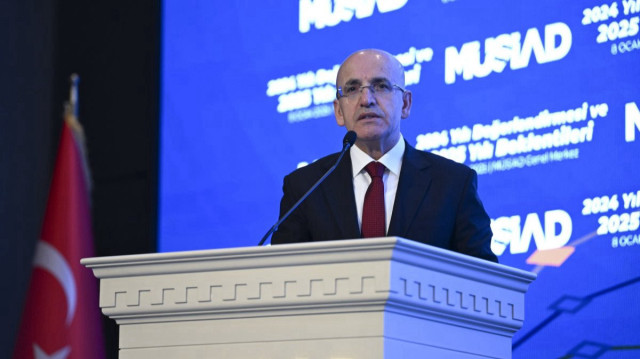
Turkish minister Mehmet Simsek shares economic developments at Bank of America Securities Türkiye Conference in London
Türkiye will continue to support disinflation with demand and supply related policies and measures in food, housing, and energy, while accelerating reforms, the Turkish treasury and finance minister said on Wednesday.
Turkish Finance Minister Mehmet Simsek attended the Bank of America (BofA) Securities Türkiye Conference in London, while the event took place for the first time since 2018.
Some 250 investors participated in the event, a first in the event's history. The event will be held on Thursday and Friday.
He noted that the decline in inflation will continue led by the delayed impact of the monetary policy, a negative fiscal impact, a more supportive wage policy, and an administered prices package in line with the inflation target.
The minister added that Türkiye's budget deficit will reduce to around 3% of gross domestic product (GDP) this year due to reduction in public spending.
Simsek said that the lump-sum tax on fuel and tobacco products, and alcoholic beverages was updated with the domestic producer price index (D-PPI) for the last six months.
He noted that the rate of increase in the special consumption tax (SCT) on fuel was limited to 6%, below the six-month D-PPI.
“The impact of this regulation on the average sale prices is around 1.4%, meaning that we are sacrificing 12 billion Turkish liras ($338.4 million) in tax revenues, while the impact of the D-PPI revisions on tobacco and alcoholic beverages will be well below the year-end inflation target,” he said.
“The weight of services, updated with the revaluation, is only 0.36% in the CPI basket,” he added.
Simsek stated that the ministry will support irrigation and land consolidation projects, providing support to food supply chain and logistics to increase supply, as well as to the reconstruction of the earthquake-stricken zone of Türkiye in the southeast.
He mentioned that social housing and urban transformation efforts will be increased as supply-side policies, while bringing energy transformation by prioritizing domestic renewable energy resources.
Simsek highlighted that the normalization of gold imports and the decline in energy imports played a key role in lowering the country's current account deficit, reducing the need for external financing, while Türkiye's main trading partners' growth outlook are expected to improve this year, and the economic recovery in Europe can offer significant opportunities for Türkiye.
“We aim to increase productivity by promoting structural reforms, trade integrations, efforts in digital and green transformation, and investments in infrastructure,” he said.
The minister underlined that Türkiye shows resilience against increasing geopolitical tensions and protectionist tendencies, as global defense spending reached historic highs.
“Our diplomatic missions, role in global affairs, refugee policies, and pioneering position in humanitarian aid go on to show Türkiye's soft power, and at a time of rising protectionism, our free trade agreements with 54 countries, including the EU, demonstrate our resilience against trade fragmentation,” he said.
“Türkiye is a strong player in the construction and contracting sectors worldwide and we can play key roles in the reconstruction of Ukraine, Libya, Yemen, Gaza, and Syria, once peace is restored in these regions,” he added.
Hello, the comments you share on our site are a valuable resource for other users. Please respect other users and different opinions. Do not use rude, offensive, derogatory, or discriminatory language.
The floor is all yours.








